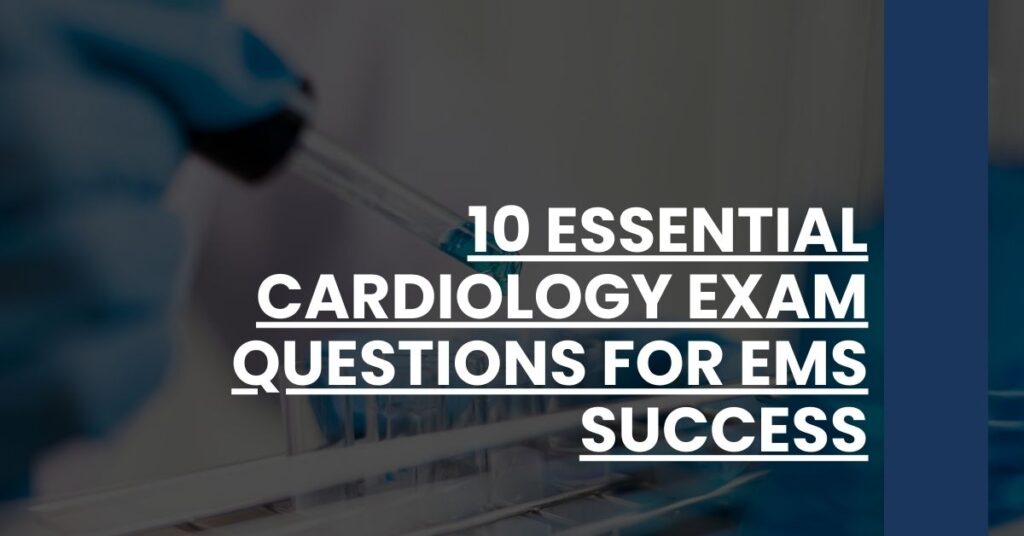Ever wondered if you’re truly prepared to tackle cardiology emergencies?
Cardiology exam questions for EMS are crucial, not just for passing tests, but for saving lives.
This article sifts through essential queries that every EMS provider must master, offering clear insights into the fundamentals of pre-hospital cardiac care.
Equip yourself with the knowledge that matters – because when seconds count, you’re the one making the difference.
- 1. Understanding Acute Coronary Syndromes
- 2. Assessment of Chest Pain
- 3. Interpretation of ECG Changes
- 4. Management of Cardiac Arrest
- 5. Pharmacology in Cardiac Emergencies
- 6. Pediatric Cardiology for EMS
- 7. Congestive Heart Failure Recognition
- 8. Rhythm Disturbances and Their Significance
- 9. Risk Stratification of Cardiac Patients
- 10. Cardiac Scenarios in Exam Simulations
- Related Topic: Best Study Practices for Cardiology Exams
- Related Topic: Legal Considerations in Cardiac Care
- Conclusion: Synthesizing Cardiology Knowledge for EMS
1. Understanding Acute Coronary Syndromes
When it comes to equipping yourself for success on your cardiology exam, you need a solid grip on acute coronary syndromes (ACS). As an EMS professional, recognizing and managing ACS can literally be the difference between life and death.
- Key Components: ACS is a term that encompasses various clinical symptoms compatible with acute myocardial ischemia. This means that an area of the heart muscle isn’t getting enough blood flow, and as you can imagine, that’s a critical situation.
- EMS Focus: In the field, your focus should be on early identification and applying the appropriate pre-hospital care. It’s crucial you ask patients about onset and quality of pain, associated symptoms, and past cardiac history.
Diving into a study on EMS telephone triage, we see that prediction models can give you a leg up in pinpointing ACS, underscoring the impact of thorough training and knowledge. Moreover, EMS providers’ ability to interpret ECGs precisely—a skill you’ll want to hone for your exam—can fast-track STEMI identification, as discussed in another insightful piece.
2. Assessment of Chest Pain
Chest pain is a red flag waving furiously in the world of cardiology. It’s imperative to approach each case with a seasoned blend of scrutiny and care. A precise assessment can pave the way to saving lives, and your cardiology exam questions for EMS will certainly test this skill.
- Quality of Discomfort: Determine if the discomfort is sharp, dull, or crushing.
- Radiation: Ask if the pain moves elsewhere in the body, particularly to the arms or neck.
- Timing: Note when the pain began and its duration.
Real-case scenarios, like those depicted on EMS1, highlight the intricacies of EKG interpretation. Moreover, the ABCDE approach to chest pain – assessing Airway, Breathing, Circulation, Disability, and Exposure – is an EMS fundamental that will feature prominently in your exams.
3. Interpretation of ECG Changes
One of the pillars of cardiac emergencies is the Electrocardiogram (ECG) – a non-negotiable skill for EMS personnel and a hot topic in cardiology exam questions for EMS. Being adept at ECG interpretation allows you to untangle the web of cardiac ailments.
- ST-segment Elevation: This can indicate a current myocardial infarction (MI).
- T-wave Inversions: Suggestive of ischemia or potential impending MI.
- Bundle Branch Blocks: These may signal underlying heart disease.
The pivotal role of ECG interpretation cannot be overstressed; it helps in the rapid identification of cardiac emergencies. Sharpen your ECG skills and you can improve clinical outcomes, which is reflected in the push for enhanced ECG interpretation training during medical education.
4. Management of Cardiac Arrest
Cardiac arrest management is the bedrock of EMS intervention. It requires swift action, precision, and confidence – all of which will be tested in your cardiology exam.
- High-quality CPR: ensuring adequate depth and rate.
- Defibrillation: when indicated, without delaying chest compressions.
Protocols for cardiac arrest stipulate a no-nonsense approach to sustain life. Embracing the role of the Code Commander, you’ll need to coordinate efforts efficiently, calling for a balance of skill and leadership that you’ll want to showcase in your exams.
5. Pharmacology in Cardiac Emergencies
Your proficiency in pharmacology can be a linchpin in cardiac emergency scenarios. As such, your cardiology exam for EMS will probe your understanding of medications – which ones to use, when, and why.
- Vasopressors: To improve blood pressure and coronary perfusion during CPR.
- Antiarrhythmics: For rhythm control in cases of refractory VFib or pulseless VT.
A deep dive into the roles of these drugs will enhance your grasp of their clinical applications. Knowing your pharmacology is power in cardiac emergencies, as outlined in a comprehensive EMS Pharmacology Reference.
6. Pediatric Cardiology for EMS
Children aren’t just small adults; they present unique challenges in cardiology, making this an area you’ll seriously need to study up on for your EMS exams.
- Congenital Heart Disease: Be aware of symptoms indicating a possible congenital issue.
- Resuscitation Differences: Familiarize yourself with the pediatric chain of survival.
Managing pediatric cardiac emergencies demands expertise, as every decision you make is amplified by the vulnerability of your patient. You’ll need to approach pediatric scenarios with extra caution and precision – qualities you’re likely to refine as you prepare for your cardiology exam.
7. Congestive Heart Failure Recognition
Recognizing the signs of congestive heart failure (CHF) in the field is paramount for EMS providers. With your understanding of CHF, you can commence life-saving management before the patient reaches the hospital.
- Breathlessness: Pay attention to patients with difficulty breathing, particularly if it’s worsened when lying flat or during exertion.
- Swelling: Look for noticeable swelling in the legs, ankles, or abdomen, which can be a telltale sign of fluid retention.
- Fatigue: Generalized weakness or fatigue may be a symptom as the body struggles to meet its metabolic demands.
Knowing the signs of CHF and its prehospital treatment can mean the difference between stability and a deteriorating condition. You’ll get valuable insight into management strategies, similar at both the EMT and AEMT levels, which will certainly be queried in your cardiology exam questions for EMS.
8. Rhythm Disturbances and Their Significance
Cardiac rhythm disturbances are a diverse group of conditions that can lead to outcomes ranging from benign to life-threatening. Your ability to recognize and interpret these disturbances smoothly and confidently is critical for both your exam and EMS practice.
- Supraventricular Tachycardia (SVT): These rhythms, although often rapid, may be hemodynamically stable or unstable.
- Ventricular Tachycardia (VT): A condition that can deteriorate rapidly and requires immediate intervention.
- Atrial Fibrillation (AF): The most common chronic dysrhythmia, which can result in complications if not managed appropriately.
Understanding the steps for a correct diagnosis and treatment of emergencies due to arrhythmias is indispensable for EMS personnel. Cardiology exam questions for EMS will probe your knowledge on these conditions, reinforcing the necessity for swift and accurate treatment.
9. Risk Stratification of Cardiac Patients
Getting to grips with risk stratification could streamline your decisions in the field, enabling you to prioritize patient transport and treatment. It’s about making a calculated assessment of the potential risk vs. benefit.
- Identify High-Risk Factors: This includes age, medical history, and specific findings on the ECG.
- Utilize Assessment Tools: Tools like the preHEART Score help categorize the risk level for a chest pain patient.
The use of point-of-care troponin tests in conjunction with clinical assessment aids efficiently in stratifying patients, a process you will decipher in your cardiology exam for EMS.
10. Cardiac Scenarios in Exam Simulations
Simulation-based testing is an innovative approach to gauge your understanding of cardiology principles. You’ll encounter diverse scenarios that mimic real-life situations, designed to test your clinical judgment and treatment strategies.
- Case Studies: You will be presented with various patient profiles and symptoms.
- Treatment Protocols: It’s crucial you recommend the appropriate treatment path based on each scenario.
The effectiveness of exam simulations is clear; they offer a window into your future performance in the field, honing the skills you will need to excel.
Related Topic: Best Study Practices for Cardiology Exams
As you gear up for the cardiology exams, consider these study practices to enhance your preparation:
- Create a Study Plan: Allocate specific blocks of time for study to ensure coverage of all topics.
- Use Simulation Apps: Opt for interactive apps that simulate ECGs and other cardiology-related diagnostics.
- Collaborative Learning: Study with peers to discuss and break down complex scenarios.
These methods not only help you prepare for the exam but also form the building blocks of effective field practice.
Related Topic: Legal Considerations in Cardiac Care
Legal know-how is a less discussed but fundamental part of your EMS training:
- Documentation: Ensure detailed recording of all patient interactions and care provided.
- Informed Consent: Be mindful to seek consent where possible, and understand the legalities for when it isn’t.
- DNR Orders: Recognize and respect Do-Not-Resuscitate orders where they are present and valid.
Being aware of these considerations will safeguard your practice and is something that cardiology exam questions for EMS may very well assess.
Conclusion: Synthesizing Cardiology Knowledge for EMS
As you reach the end of this guide, take a moment to appreciate the breadth of knowledge you’ve engaged with. From recognizing congestive heart failure to decoding rhythm disturbances and managing cardiac arrest — the spectrum of cardiology is vast but conquerable.
Your expert handling of cardiology exam questions for EMS will be a testament, not just to your ability to pass an exam, but to stand firm in the face of adversity, making split-second decisions that could change lives.
Remember, this journey is as much about acquiring knowledge as it is about synthesizing it into the fiber of your commitment to saving lives. You’re not just studying to remember; you’re learning to apply — endlessly, compassionately, confidently.
Cardiology exam questions for EMS essential for success. Master acute coronary syndromes, ECG interpretation, and cardiac arrest management.

